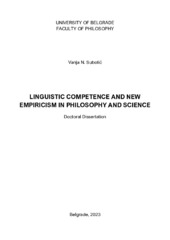Приказ основних података о дисертацији
Linguistic competence and new empiricism in philosophy and science
Језичка компетенција и нови емпиризам у филозофији и науци
| dc.contributor.advisor | Milojević, Miljana | |
| dc.contributor.other | Radenović, Ljiljana | |
| dc.contributor.other | Milevski, Voin | |
| dc.contributor.other | Devedžić, Vladan | |
| dc.contributor.other | Malatesti, Luca | |
| dc.creator | Subotić, Vanja | |
| dc.date.accessioned | 2024-04-15T14:55:20Z | |
| dc.date.available | 2024-04-15T14:55:20Z | |
| dc.date.issued | 2023-12-14 | |
| dc.identifier.uri | https://eteze.bg.ac.rs/application/showtheses?thesesId=9599 | |
| dc.identifier.uri | https://fedorabg.bg.ac.rs/fedora/get/o:33444/bdef:Content/download | |
| dc.identifier.uri | https://plus.cobiss.net/cobiss/sr/sr/bib/139072009 | |
| dc.identifier.uri | https://nardus.mpn.gov.rs/handle/123456789/22415 | |
| dc.description.abstract | The topic of this dissertation is the nature of linguistic competence, the capacity to understand and produce sentences of natural language. I defend the empiricist account of linguistic competence embedded in the connectionist cognitive science. This strand of cognitive science has been opposed to the traditional symbolic cognitive science, coupled with transformational-generative grammar, which was committed to nativism due to the view that human cognition, including language capacity, should be construed in terms of symbolic representations and hardwired rules. Similarly, linguistic competence in this framework was regarded as being innate, rule-governed, domain-specific and fundamentally different from performance, i.e., idiosyncrasies and factors governing linguistic behavior. I analyze state-of-the-art connectionist, deep learning models of natural language processing, most notably large language models, to see what they can tell us about linguistic competence. Deep learning is a statistical technique for the classification of patterns through which artificial intelligence researchers train artificial neural networks containing multiple layers that crunch a gargantuan amount of textual and/or visual data. I argue that these models suggest that linguistic competence should be construed as stochastic, pattern-based, and stemming from domain-general mechanisms. Moreover, I distinguish syntactic from semantic competence, and I show for each the ramifications of the endorsement of connectionist research program as opposed to the traditional symbolic cognitive science and transformational-generative grammar. I provide a unifying front, consisting of usage-based theories, construction grammar approach, and embodied approach to cognition to show that the more multimodal and diverse models are in terms of architectural features and training data, the stronger the case is for the connectionist linguistic competence. I also propose to discard the competence vs. performance distinction as theoretically inferior so that a novel and an integrative account of linguistic competence originating in connectionism and empiricism that I propose and defend in the dissertation could be put forward in scientific and philosophical literature. | sr |
| dc.format | application/pdf | |
| dc.language | sr | |
| dc.publisher | Универзитет у Београду, Филозофски факултет | sr |
| dc.rights | openAccess | en |
| dc.source | Универзитет у Београду | sr |
| dc.subject | Linguistic Competence, Natural Language Processing, Connectionism, Empiricism, Nativism, Deep Learning, Large Language Models | sr |
| dc.title | Linguistic competence and new empiricism in philosophy and science | sr |
| dc.title.alternative | Језичка компетенција и нови емпиризам у филозофији и науци | en |
| dc.type | doctoralThesis | |
| dc.rights.license | Autorstvo-Deliti pod istim uslovima 3.0 Srbija (CC BY-SA 3.0) | |
| dc.identifier.fulltext | http://nardus.mpn.gov.rs/bitstream/id/160730/Disertacija_15438.pdf | |
| dc.identifier.fulltext | http://nardus.mpn.gov.rs/bitstream/id/160731/Referat.pdf | |
| dc.identifier.rcub | https://hdl.handle.net/21.15107/rcub_nardus_22415 |



